The AMD 3rd Gen Ryzen Deep Dive Review: 3700X and 3900X Raising The Bar
by Andrei Frumusanu & Gavin Bonshor on July 7, 2019 9:00 AM EST** = Old results marked were performed with the original BIOS & boost behaviour as published on 7/7.
Benchmarking Performance: CPU Encoding Tests
With the rise of streaming, vlogs, and video content as a whole, encoding and transcoding tests are becoming ever more important. Not only are more home users and gamers needing to convert video files into something more manageable, for streaming or archival purposes, but the servers that manage the output also manage around data and log files with compression and decompression. Our encoding tasks are focused around these important scenarios, with input from the community for the best implementation of real-world testing.
All of our benchmark results can also be found in our benchmark engine, Bench.
Handbrake 1.1.0: Streaming and Archival Video Transcoding
A popular open source tool, Handbrake is the anything-to-anything video conversion software that a number of people use as a reference point. The danger is always on version numbers and optimization, for example the latest versions of the software can take advantage of AVX-512 and OpenCL to accelerate certain types of transcoding and algorithms. The version we use here is a pure CPU play, with common transcoding variations.
We have split Handbrake up into several tests, using a Logitech C920 1080p60 native webcam recording (essentially a streamer recording), and convert them into two types of streaming formats and one for archival. The output settings used are:
- 720p60 at 6000 kbps constant bit rate, fast setting, high profile
- 1080p60 at 3500 kbps constant bit rate, faster setting, main profile
- 1080p60 HEVC at 3500 kbps variable bit rate, fast setting, main profile
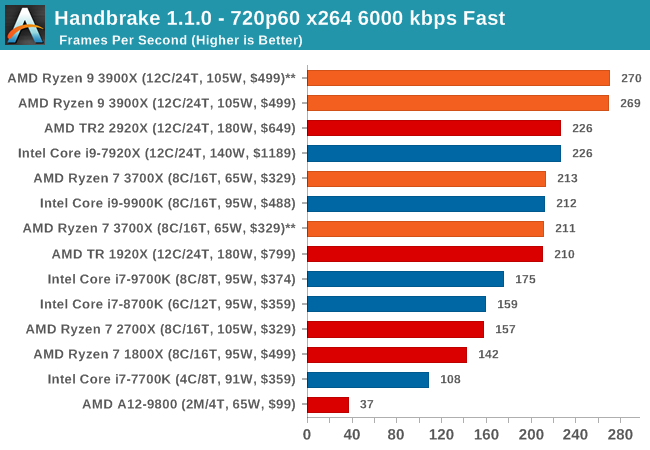
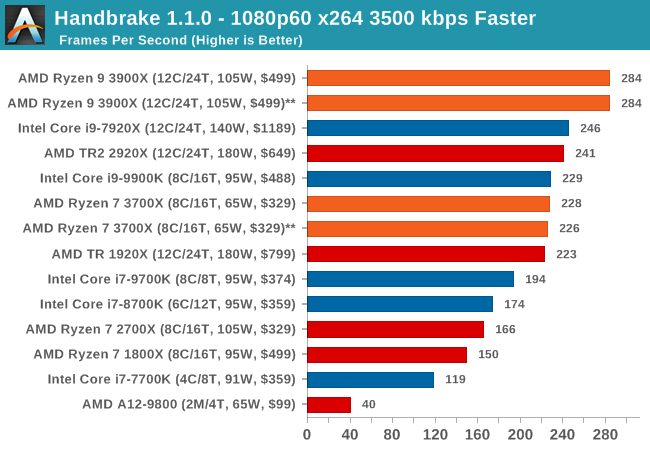
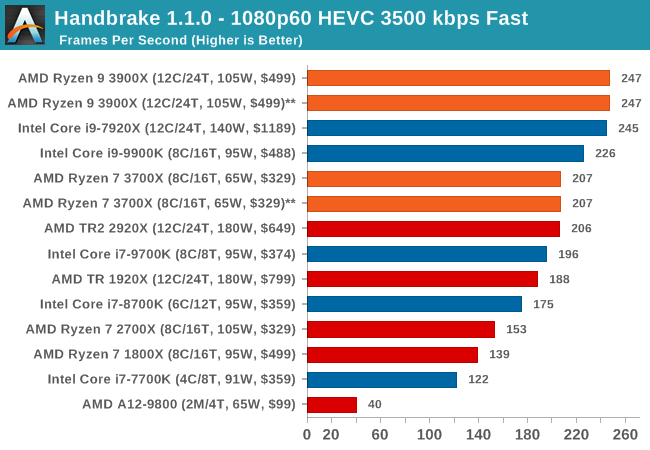
7-zip v1805: Popular Open-Source Encoding Engine
Out of our compression/decompression tool tests, 7-zip is the most requested and comes with a built-in benchmark. For our test suite, we’ve pulled the latest version of the software and we run the benchmark from the command line, reporting the compression, decompression, and a combined score.
It is noted in this benchmark that the latest multi-die processors have very bi-modal performance between compression and decompression, performing well in one and badly in the other. There are also discussions around how the Windows Scheduler is implementing every thread. As we get more results, it will be interesting to see how this plays out.
(Please note, if you plan to share the Compression graph, we'd appreciate it if you could please include the Decompression graph as well. Otherwise you’re only presenting half of the picture)
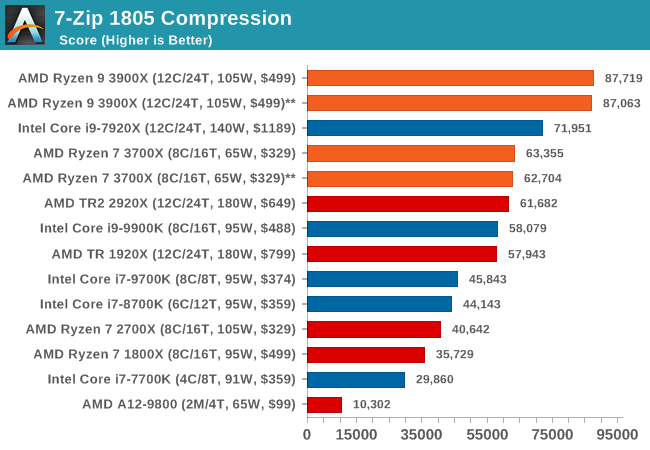
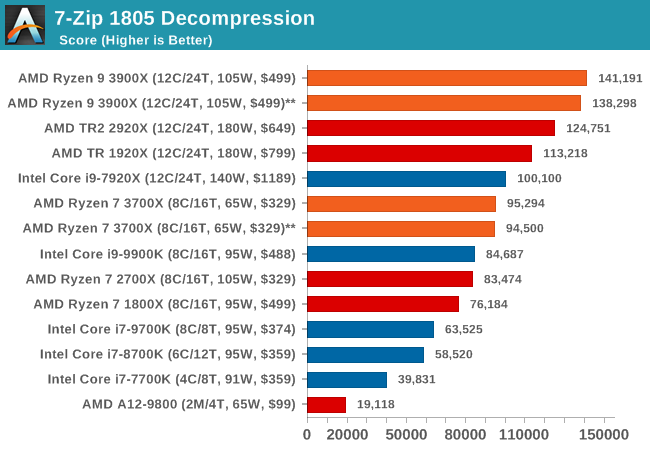
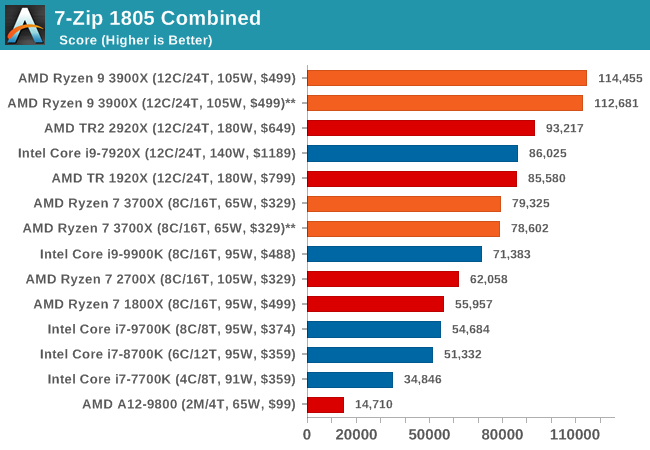
WinRAR 5.60b3: Archiving Tool
My compression tool of choice is often WinRAR, having been one of the first tools a number of my generation used over two decades ago. The interface has not changed much, although the integration with Windows right click commands is always a plus. It has no in-built test, so we run a compression over a set directory containing over thirty 60-second video files and 2000 small web-based files at a normal compression rate.
WinRAR is variable threaded but also susceptible to caching, so in our test we run it 10 times and take the average of the last five, leaving the test purely for raw CPU compute performance.
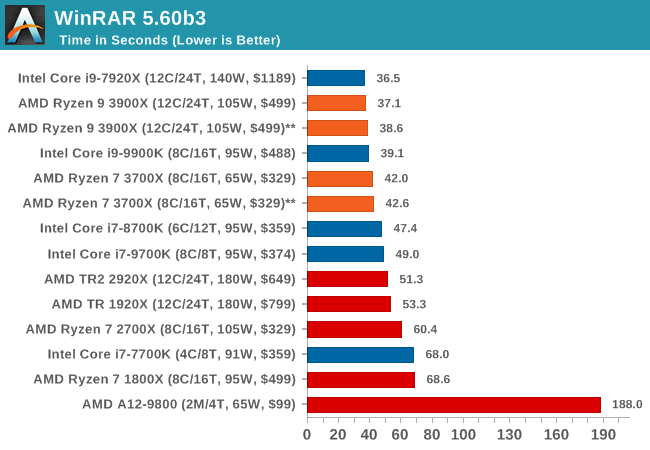
AES Encryption: File Security
A number of platforms, particularly mobile devices, are now offering encryption by default with file systems in order to protect the contents. Windows based devices have these options as well, often applied by BitLocker or third-party software. In our AES encryption test, we used the discontinued TrueCrypt for its built-in benchmark, which tests several encryption algorithms directly in memory.
The data we take for this test is the combined AES encrypt/decrypt performance, measured in gigabytes per second. The software does use AES commands for processors that offer hardware selection, however not AVX-512.
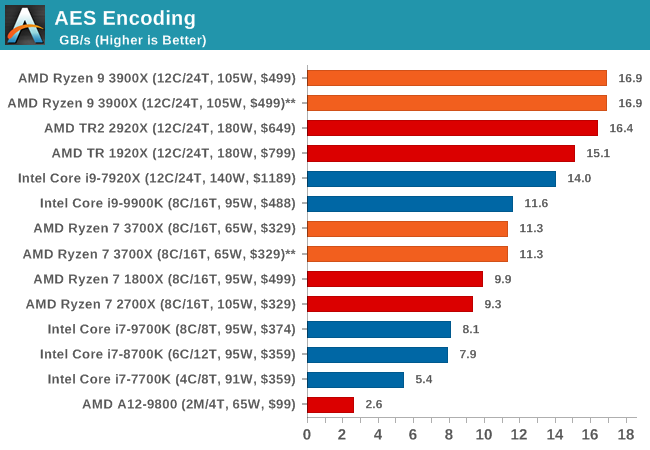










447 Comments
View All Comments
shakazulu667 - Sunday, July 7, 2019 - link
Is there a compilation test coming for chromium or another big source tree, that would show if new IO arch brings wider benefits for such CPU+IO workloads?Andrei Frumusanu - Sunday, July 7, 2019 - link
We'll be re-adding the Chromium compile test in the next few days - there were a few technical hiccups when running it.shakazulu667 - Sunday, July 7, 2019 - link
Thanks, I'm looking forward to it, especially curious if AMD can utilize NVMe better for this kind of workload.Andrei Frumusanu - Sunday, July 7, 2019 - link
Unfortunately we don't test the CPU suite with different SSDs for this.shakazulu667 - Sunday, July 7, 2019 - link
Is there another test in your suite that could show improvements with IO , incl NVMe?RSAUser - Monday, July 8, 2019 - link
But one of the big features is PCIe 4 support, so testing with an nvme drive as well to show difference would be important? People spending $490 on a CPU only are probably going to be buying an Nvme SSD.A5 - Monday, July 8, 2019 - link
There aren't any PCIe 4 SSDs for them to test with.0ldman79 - Monday, July 8, 2019 - link
Yep, PCIe 4.0 NVME is going to be beta at this point at best.Last I read the first 4.0 NVME to be released is essentially running an overclocked 3.0 interface, which the list of NVME that can saturate 3.0 is pretty short as it is.
RSAUser - Tuesday, July 9, 2019 - link
That's because these are the first PCIe 4 slots that exist, can't release a product that can't even be used.Using an overlocked drive in lieu of a 4 one is the proper thing to do.
Kevin G - Tuesday, July 9, 2019 - link
For consumers yes but the first PCIe 4.0 host system was the IBM POWER9 released ~18 months ago. As such there are a handful of NIC and accelerators for servers out there today.The real oddity is that nVidia doesn’t support PCIe 4.0. Volta’s nvLink has a PHY based upon PCIe 4.0. Turing should as well though nVidia doesn’t par those chips with the previously mentioned POWER9.